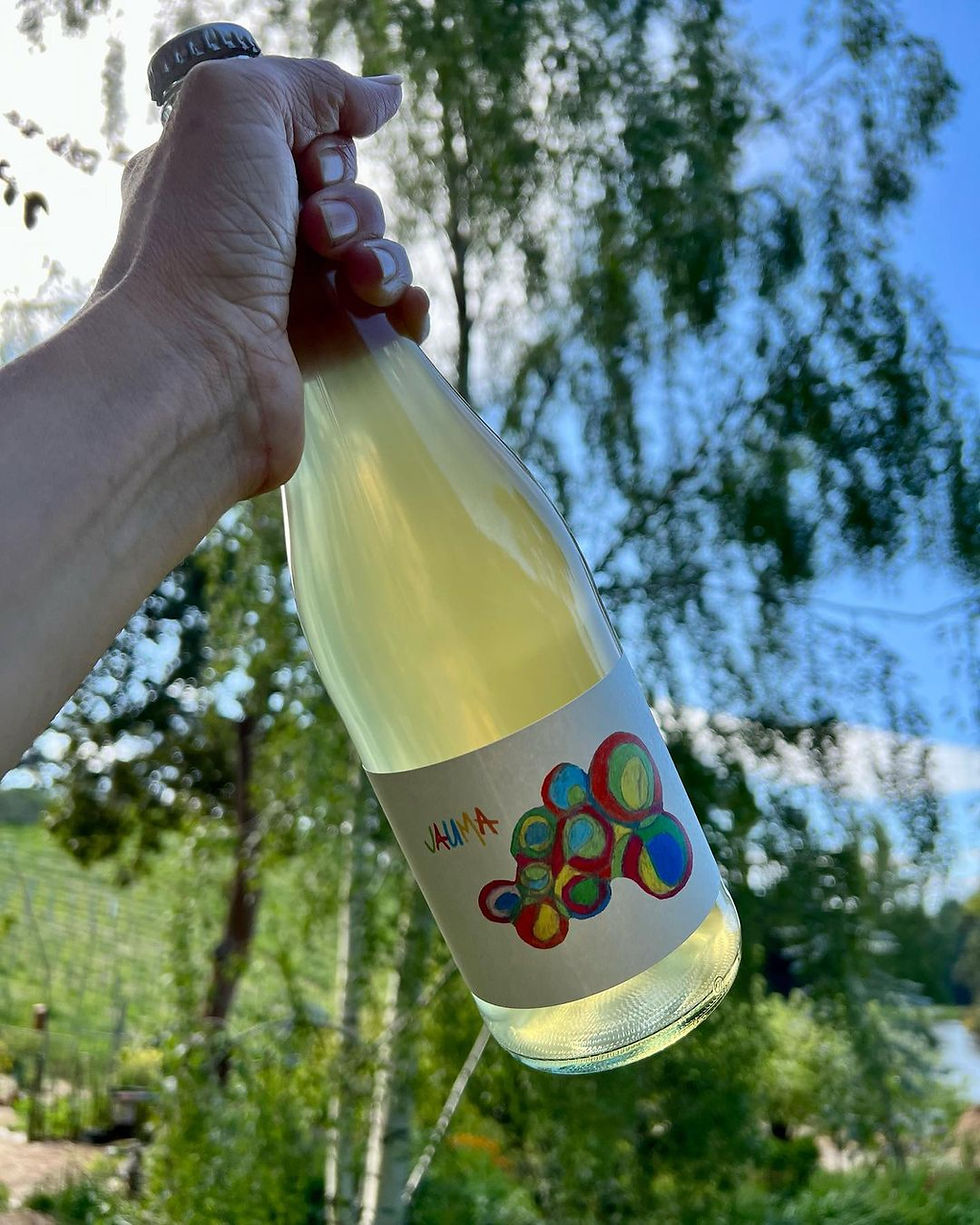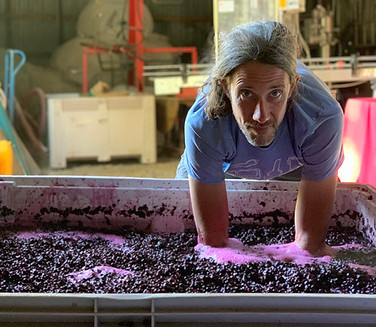
Jauma natural wines
All Jauma Wines are natural wines — made from organic fruit, with zero additions of anything but grapes. Juicy, rich, textural, alive, and vibrant, these wines are grown and farmed on Kaurna Land in South Australia. They speak directly from the soil and are lovingly handcrafted by James Erskine and the Jauma team, here at Jauma Farm in the Adelaide Hills.

Natural wine made from organic grapes, nothing more
Jauma wine is made from organically grown McLaren Vale fruit. The vineyards have been managed by Fiona Wood and Dave Gartelman for over a decade. Varieties farmed include Grenache, Chenin Blanc, Shiraz, and Arneis.
Our wines are produced here on Jauma Farm at Lenswood in the Adelaide Hills.
Since moving to the farm, plantings of Chenin, Savignin, Cabernet Franc, Gewurztraminer and Gamay have been added, and will produce wine in the years to come.
Inside the winery, Jauma produces wines from grapes, nothing more. There are no additions of anything — no sulfur, yeasts, acids, tannins, chemicals, preservatives, filtration, polymers, colours, nor any fish, egg or plastic settling agents.
This creates pure and living wines, uninhibited in their portrayal of fruit, terroir and character.
Jauma Wine is famous around the world for it's stability, brightness, integrity, purity, fun and fullness of flavour.


Hand-crafted by James Erskine

Jauma winemaker
The small Jauma winemaking team is led by James Erskine, who has pioneered Australian natural wine since 2010. His winemaking journey has taken him around the world, with Jauma wines now enjoyed in over 15 international markets.
James started his career in hospitality, where he became an award-winning sommelier and top wine show judge.
In 2008 James topped the Australian International Court of Master Sommeliers exams. In 2009 he was voted Gourmet Traveller Australian Sommelier of the Year and secured the prestigious Negociants Australia’s Working with Wine Fellowship.
Between vintages and restaurant hours, James went on to complete an honours degree in Agricultural Science through the University of Adelaide and University of California Davis, specialising in soil chemistry.
These days, James and his family run Jauma Farm on Peramangk country in Lenswood, a certified organic property growing cherries, grapevines, apples, pears and vegetables.
As a natural winemaker and farmer, James explores enhancing soil life, activating water use efficiency and disease resistance, nurturing soil and plant health, minimising compaction, utilising activated aerated compost teas, co-cropping, and no-till systems.
Pioneering natural wine since 2010

James Erskine was part of an Aussie gang called Natural Selection Theory, formed in 2010. It played a major role in creating the natural wine movement in Australia and had a profound impact on the wider wine world.
It all began when James and two fellow South Aussie natural winemakers — Tom Shobbrook and Anton van Klopper — began asking some bigger questions about wine and its industry.
Pretty soon, this motley trio was travelling the country in a Land Rover, sleeping on the side of the road and selling demijohns full of sulphite-free wine, which they called 'Voice of the People'.
With this 'simple is best' approach, Natural Selection Theory laid the groundwork for a more open-minded, creative, environmentally conscious and irreverent Australian wine culture.
What is natural wine?
Natural wines arose as a reaction to the chemical industrialisation of farming and the normalisation of chemical additions in the making of wine.
By contrast, natural wine is a philosophy of working with what you have, rather than polishing something to shine so bright you no longer see its form or individuality.
At the same time, natural wine questions: what is good wine and who defines this cultural paradigm?
At its best, natural wine offers a unique tale of place and time, with the utmost respect for land and people who work the land. Because this is THE time to make real sustainable practices the norm.


The Adelaide Hills is Australia's natural wine capital.
These natural, living wines are organically farmed and each bottle contains unfiltered, fermented grape juice — nothing else.
Natural wines do taste different to other wine styles — because they are alive. 'Do they age well?' is a question we're often asked. Well, want to try 6-year-old preservative-free, living wine that's bright and supple?




Common questions about natural wine
Do natural wines age well?
Why is there a spritz in the wines?
Why are they bottled under crown seal?
Natural wines do taste different to other wine styles — because they are alive.
We are convinced that our natural wines age as well as any other wines — but they do age differently as they are alive. They are not delicate drinks that will fall over once opened; they need air if they've been cellared.
Carbon dioxide is trapped in wines as a bi-product of fermentation. As wines in the cellar warm up in spring, they begin to de-gas, a bit like a soft drink warming on a table, but not all the gas leaves the wines.
Most wineries will degas their wines by bubbling a non-dissolvable gas through the wines before bottling. This process does not suit natural wines and also strips some of the aromatics.
James first saw still wines bottled under crown seal in Japan and thought: 'What a brilliant idea.' He'd seen too many 'off' flavours from corks he had previously used. In contrast, the uptake of oxygen is minimised under crown seal and the steel cap can also be recycled.
Plus, as a sommelier, James never enjoyed the practice of opening a wine under screw cap. He felt there was no energetic exchange — whereas with a crown seal, you still need to actively find something to open the bottle, like with a cork.
.jpg)

Where to taste Jauma natural wines

Online & in-store
Buy our wines direct from our online store or find us in your local living wine-loving bottle shops, bars and restaurants worldwide.

On-farm events
We don’t have a permanent public tasting room, but occasionally throw events to welcome you for a glass and a yarn.

Annual JaumaFest
Each December, we throw a two-day cherry-picking party with live music, street food, a local maker market and — of course — a Jauma wine bar.
We hope our wines find their way into your hands...
To be enjoyed at dinner tables, backyard picnics, community pot lucks and by the fireside, along with good company and nourishing conversation.












